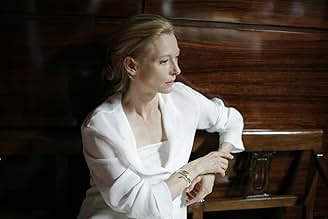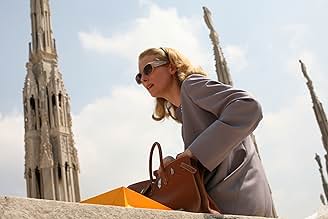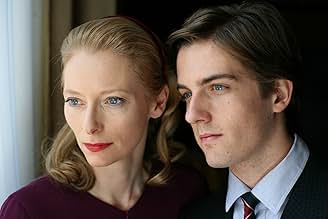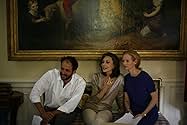Emma abandonó Rusia para vivir con su marido en Italia. Ahora forma parte de una poderosa familia industrial y aunque es una madre respetada de tres hijos, no es feliz. Un día, Antonio, un c... Leer todoEmma abandonó Rusia para vivir con su marido en Italia. Ahora forma parte de una poderosa familia industrial y aunque es una madre respetada de tres hijos, no es feliz. Un día, Antonio, un chef con mucho talento y amigo de su hijo, le hará ver las cosas de forma completamente dis... Leer todoEmma abandonó Rusia para vivir con su marido en Italia. Ahora forma parte de una poderosa familia industrial y aunque es una madre respetada de tres hijos, no es feliz. Un día, Antonio, un chef con mucho talento y amigo de su hijo, le hará ver las cosas de forma completamente distinta.
- Dirección
- Guionistas
- Elenco
- Nominado a 1 premio Óscar
- 16 premios ganados y 47 nominaciones en total
Opiniones destacadas
Written by Barbara Alberti, Ivan Cotroneo, Walter Fasano and Guadagnino and based on a story by the director, the film begins in snowy Milan in the winter. The very wealthy Recchi family, owners of a textile factory that it is hinted supported Musolini and the Fascists during the war, is having a dinner party in their aristocratic house catered by a host of servants wearing white gloves. The elderly grandfather and patriarch of the family Edoardo Sr. (Gabrielle Ferzetti) is about to retire, evoking the Visconti film, The Leopard. Shockwaves roll throughout the gathering, however, when he names both his son Tancredi (Pippo Delbono) and his handsome grandson Edo (Flavio Parenti) as joint controllers of the business. Befitting the family's pride, when Edo tells the group that he has come in second in a race, the elderly patriarch says "The Recchis never lose." The Russian born Emma (Tilda Swinton) is Tancredi's wife and mother of three grown children, sons Edo and Gianluca (Mattia Zacarro), and artist and photographer daughter Betta (Alba Rohrwacher). Though on the surface she is a loyal and supporting wife and mother and has made a complete adjustment to the Italian bourgeois way of life, underneath there is a growing boredom and discontent as sensed by her servant Ida (Maria Paiato). We get a hint of this stirring when daughter Betta reveals to her that she is a Lesbian and is in love with a fellow classmate in England. The longing for adventure crystallizes further when she meets Edo's friend Antonio (Edoardo Gabbriellini) who is a master chef who is planning to open a restaurant with Edo.
Joining her mother-in-law Allegra (Marisa Berenson) and Edo's girl friend Eva (Diane Fleri) for lunch, Emma's senses are fully awakened while eating prawns prepared by Antonio. Passing through San Remo on a trip to Nice to attend an exhibition to which she has been invited by daughter Betta, Emma unexpectedly bumps into Antonio who eagerly invites her to view the restaurant site. Despite the fact that Antonio is probably 10 to 15 years younger than her, this chance encounter leads to a bursting forth of Emma's tightly controlled sexual inhibitions and a swirl of passionate lovemaking in the rustic countryside, their engaged body parts mirrored by close-up shots of flowers and insects in a very poetic but overly aestheticized manner.
Reminiscent of Ibsen's 1879 play The Doll's House, the main thrust of the film is the repression of an upper class woman who suddenly discovers that there should be more zest to her life, presumably triggered by her daughter's openness in discussing her sexual preference. The love affair, however, triggers many changes in the Recchi family, both economically and psychologically. Tancredi is forced to sell their business to an Indian investor who explains that "capitalism is democracy". The scenes in London with the financiers are very strong but are treated as a minor sub-plot with the emphasis quickly given over to the family's psychological distress.
When Edo puts two and two together and realizes his mother's sexual adventures with his best friend, the result is tragedy for the entire family, a series of events handled by the director in an involving but melodramatic fashion. Though Emma has been praised by some for the courage she shows in breaking away from a static marriage, one wonders if a greater courage would perhaps have been shown if she had gotten in touch with the love she once had for her husband, fulfilled her solemn oath, "till death do us part", and resumed her responsibilities as a caring mother. While I was moved by much of the visual beauty of the film and the idea of breaking with tradition and listening to the voices within, I was infrequently emotionally involved with the characters and I Am Love felt distant and often contrived.
Really. I was amazed. You see, I'm such a sucker for emotional engagement with characters – I'll laugh, cry, hate, fear, cheer and philosophise along with pretty much any film I watch. I'm a producers dream.
But this? It washes over you and you sit (admiring the view) in the hope and expectation that something is going to happen soon. Something will surprise you. A character will suddenly come to life – reach out and draw you in. That you'll get a golden moment, or even a whiff of cinematic soul. But no. Nothing.
So – there it is. There's either something vital that I'm missing here or this emperor is indeed stark naked? I Am Disappointed.
But if you like people more than stories. If you want to see film-making at its most graceful and organic and inventive, if you want a musical score that will turn a sidelong glance into an operatic overture, then this IS the movie for you. It is a baroque masterwork. A cathedral of a film. Cold as stone but inspiring the soul.
Tilda Swinton is a goddess. She says so little, but communicates so much. There's an entire ocean of emotion inside or her, spilling out of her eyes. I cried twice at this film. Once because of the subject matter and then again at the delicacy of the film-making. Don't let people with conservative tastes and conventional ideas of film and story tell you not to go see this movie. They are robbing you of experiencing pure emotive cinema.
Director's Trademarks: The Films of Luca Guadagnino
Director's Trademarks: The Films of Luca Guadagnino
¿Sabías que…?
- TriviaLead actress Tilda Swinton learned both Italian and Russian for the part, neither of which she spoke before filming.
- ErroresWhen Edoardo and Elisabetta meet in London, there's a lot of shadow on the pavement. When they walk away together in the next shot, there's a lot more sun. But the weather can change quickly in the UK.
- Citas
Elisabetta Recchi: Happy is a word that makes one sad.
- ConexionesFeatured in At the Movies: Venice Film Festival 2009 (2009)
Selecciones populares
- How long is I Am Love?Con tecnología de Alexa
Detalles
- Fecha de lanzamiento
- País de origen
- Sitios oficiales
- Idiomas
- También se conoce como
- I Am Love
- Locaciones de filmación
- Villa Necchi Campiglio, Milan, Lombardia, Italia(Recchis' villa)
- Productoras
- Ver más créditos de la compañía en IMDbPro
Taquilla
- Presupuesto
- EUR 3,600,000 (estimado)
- Total en EE. UU. y Canadá
- USD 5,005,465
- Fin de semana de estreno en EE. UU. y Canadá
- USD 121,504
- 20 jun 2010
- Total a nivel mundial
- USD 12,747,768
- Tiempo de ejecución
- 2h(120 min)
- Color
- Mezcla de sonido
- Relación de aspecto
- 1.85 : 1































